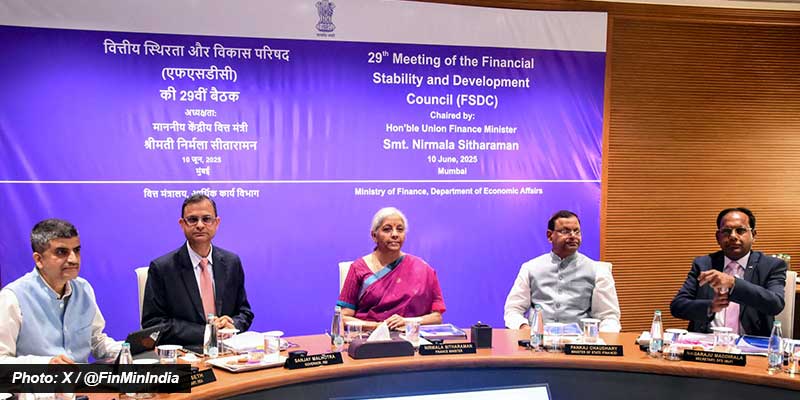- India
- Jun 11
Explainer - Financial Stability and Development Council (FSDC)
• Union Minister for Finance and Corporate Affairs Nirmala Sitharaman chaired the 29th meeting of the Financial Stability and Development Council (FSDC) in Mumbai on June 10.
• Sitharaman asked the Council to take proactive steps to ensure that citizens should have a seamless experience with respect to KYC processes across the financial sector.
• She emphasised that the interest of common citizens should be kept in mind and expeditiously refund the claims of the rightful claimants.
• The minister urged the regulators and departments to expedite the process of refund to rightful owners of unclaimed amounts by holding special district-level camps. The unclaimed amounts comprise deposits in banks; unclaimed shares and dividends are managed by Investor Education and Protection Fund Authority (IEPFA); and unclaimed insurance and pension funds are with Insurance Regulatory Development Authority of India (IRDAI) and Pension Fund Regulatory and Development Authority respectively.
• Unclaimed deposits with banks have witnessed a 26 per cent jump year on year to Rs 78,213 crore at the end of March 2024, as per the latest RBI Annual Report.
Financial Stability and Development Council (FSDC)
• The Financial Stability and Development Council (FSDC) was set up by the government as the apex level forum in December 2010 with a view to strengthening and institutionalising the mechanism for maintaining financial stability, enhancing inter-regulatory coordination and promoting financial sector development.
• The Union Finance Minister is the chairperson of the Council.
• Members include the Minister of State for finance, the heads of the financial sector regulators (RBI, SEBI, PFRDA, IRDA & Forward Markets Commission) and secretaries of the relevant ministries/departments of the government.
• The Council can invite experts to its meeting if required.
• The Financial Stability and Cyber Security (FS&CS) Division in the Department of Economic Affairs provides secretarial assistance to the FSDC.
Functions of FSDC:
• Without prejudice to the autonomy of regulators, the Council monitors macro prudential supervision of the economy, including functioning of large financial conglomerates, and addresses inter-regulatory coordination and financial sector development issues.
• It also focuses on financial literacy and financial inclusion.
• The Council deliberates on contextual issues covering financial stability, financial sector development.
• It coordinates India’s international interfaces with financial sector bodies like the Financial Action Task Force (FATF) and the Financial Stability Board (FSB).
FSDC Sub-Committee (FSDC-SC)
• The FSDC is supported by a Sub-Committee (FSDC-SC), chaired by the RBI governor.
• Excluding the Chair of the FSDC and the MoS (Finance), all members of the FSDC are also the members of the Sub-Committee.
• Additionally, all four deputy governors (DG) of RBI, and secretary (FSDC), are also the members of the sub-committee.
• Financial Stability Report (FSR) acts as a communication tool of the central bank in limiting instability by pointing out the key risks and vulnerabilities, which may have systemic impact, to policy makers, market participants and the public at large.
• It reflects the collective assessment of the Sub-Committee of the Financial Stability and Development Council (FSDC-SC) on risks to financial stability and the resilience of the financial system in the context of contemporaneous issues relating to development and regulation of the financial sector.
Various working groups/technical groups
There are various working groups/technical groups constituted under the aegis of the FSDC.
1) The Inter-Regulatory Technical Group was set up in September 2011 for the purpose of inter-regulatory coordination among the financial sector regulators. The Group generally meets once in every two to three months and discusses issues relating to risks to systemic financial stability and inter-regulatory coordination and provides inputs to the sub-committee.
2) The Technical Group on Financial Inclusion and Financial Literacy was set up in November 2011. The Group is chaired by RBI deputy governor who is in charge of financial stability and has representatives from all regulators.
3) Inter Regulatory Forum for monitoring Financial Conglomerates (IRF-FC), modelled around the ‘lead regulator’ principle, was set up in August 2012. The IRF-FC is headed by RBI deputy governor (in-charge-of the Department of Banking Supervision) and represented by senior representatives of all the financial sector regulators at the level of executive directors.
4) The Early Warning Group was set up by the FSDC Sub-Committee in June 2012. The Group is chaired by RBI deputy governor who is in charge of Financial Markets Department.
5) The Macro Financial Monitoring Group was set up in May 2012, which meets regularly in DEA, to discuss any specific emergent issues. This Group is chaired by the Chief Economic Adviser and has representation from all the departments of the ministry of finance.
Manorama Yearbook app is now available on Google Play Store and iOS App Store

